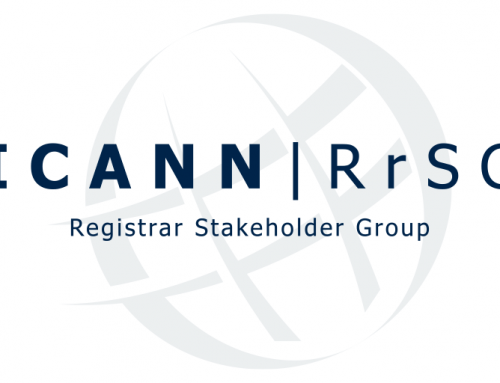It has been an eventful week for Registrars here at ICANN 43 in Costa Rica. The Registrar Stakeholder Group (RrSG) has worked to lead community understanding on important issues, held a face-to-face meeting with members of law enforcement, vigorously participated in community work, and, of course, gathered as a group to hear from ICANN staff and engage with the ICANN Board and other constituent ICANN groups.
More specifically, members of the RrSG: (i) updated the community on the status of its negotiations with ICANN staff on amendments to the Registrar Accreditation Agreement; (ii) organized a workshop on varying approaches to online information verification; (iii) directly engaged with law enforcement representatives to better understand their needs and explore their proposals relating to information verification, and (iv) held a productive group meeting where we received a variety of reports from staff and the community and engaged in vigorous discussion on several topics.
I – Update on RAA
At ICANN 42 in November, the Board directed staff to negotiate with registrars the policy requests of the community, some of which could be enshrined in the Registrar Accreditation Agreement.
The requests of law enforcement were given the high priority and were the immediate focus of ICANN staff and Registrars. Over the course of five in-person meetings and dozens of phone calls, Registrars and ICANN staff exchanged numerous proposed language drafts. Additionally, Registrars have worked directly with members of the Government Advisory Committee and law enforcement representatives to ensure that their requests were fully clarified. This has increased the effectiveness of the work and reduced the time necessary for the parties to the contract to complete the negotiations. The intense schedule of negotiations has been collaborative, in good faith, though sometimes both vigorous and contentious.
This has produced significant, material progress. However, at times, complicating issues have slowed progress, including the implications of proposals on data privacy laws, varying jurisdictions, freedom of speech and the digital divide.
Additionally, Registrars are aware that many community members have significant concerns about some of the proposals. It was this recognition that led us to organize the information verification workshop on Monday. At the workshop, the community was able to learn about how information verification works inside and outside the DNS space, learn about what implications it could have on all the members of the Internet ecosystem, and contribute practical ideas toward results.
As we return to this work, we repeat that registrars are interested in a rapid conclusion without sacrificing the quality of the end product. Further, we look to build on the success of the community’s collaboration on identity validation and other issues of mutual interest.
II – Information Verification Panel
In collaboration with ICANN staff and members of the Governmental Advisory Committee and law enforcement, Registrars organized a panel on monday that focused on how information is verified in various situations in the DNS and non-DNS contexts. Information relating to the workshop, including the presentations, can be found here http://costarica43.icann.org/node/29531.
One important outcome of the panel was to reveal the level of complexity involved with the issue of verification, the many models in which information is verified, and the significant and material ways in which verification can impact individuals using the DNS. Additionally, the law enforcement representative on the panel presented an interesting information verification model http://costarica43.icann.org/meetings/sanjose2012/presentation-whois-validation-model-12mar12-en.pdf that introduced a scoring system for verification of WHOIS information, but did not proscribe actual verification methodologies. Lastly, the session highlighted the significant community interest in information verification, as partially expressed in comments to the issues report staff prepared on RAA Amendments http://gnso.icann.org/issues/raa/fInal-issue-report-raa-06mar12-en.pdf, and desire of community members to have input into the design of verification requirements.
III – Direct Engagement with Law Enforcement
Registrars had a productive meeting with law enforcement representatives on Monday. Important outcomes of the meeting were greater Registrar understanding of the problems that law enforcement are trying to solve with their various requests for changes to the RAA and discussion of challenges relating to some of the methods that law enforcement representatives suggested for how WHOIS information could be verified. It is the hope that continued direct dialogue between Registrars and law enforcement will lead to a faster resolution to the RAA negotiations and to a make what will be an on-going relationship between Registrars and law enforcement more productive and collaborate.
IV – Constructive Stakeholder Group Meeting
With more than thirty registrars represented in the room and several joining by telephone, the RrSG completed a very successful meeting on Tuesday. In addition to getting updates from ICANN compliance and policy staff, the group engaged with the ICANN board, members of the Registry Stakeholder Group Non-Commercial Stakeholders’ Group, and discussed policy issues up for vote in the Generic Name Supporting Organization and RrSG group operations. More specifically, some of the issues discussed were:
– the updates to the Inter Registrar Transfer Policy that will come into effect in June of 2012 http://costarica43.icann.org/meetings/sanjose2012/presentation-irtp-b-implementation-13mar12-en.pdf
– ICANN compliance staff efforts http://costarica43.icann.org/meetings/sanjose2012/presentation-contractual-compliance-11mar12-en.pdf, with a special focus on (i) the low number of law enforcement complaints (3) out of all complaints (16,000) over between October 2011 and February 2012 (ii) increasing the priority that ICANN staff give to complaints by law enforcement
– Impressing upon the ICANN Board the appreciation by the RrSG that negotiations on the RAA need to conclude as rapidly as possible but that the RrSG was concerned that quality should be more important than any deadline and that it felt more community input on solutions relating to information verification and collection issues may be necessary. – an update to the RrSG bylaws to bring them into conformity with the current needs of the group from an operational perspective.
Click for presentations, photos and other documents from ICANN 43 and previous meetings


